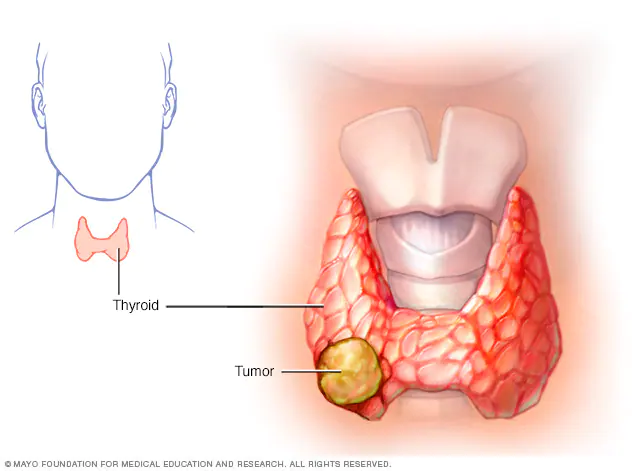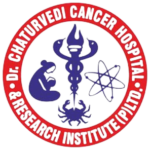Thyroid cancer is a type of cancer that begins in the cells of the thyroid gland, a butterfly-shaped gland located at the base of the neck, just below the Adam’s apple. The thyroid gland produces hormones that regulate metabolism and other essential functions of the body. Thyroid cancer is relatively uncommon compared to other types of cancer but is generally treatable and has a high survival rate.

Types of Thyroid Cancer: There are several types of thyroid cancer, including:
- Papillary thyroid carcinoma: This is the most common type, accounting for about 80% of thyroid cancer cases. It usually grows slowly and is highly treatable.
- Follicular thyroid carcinoma: This type accounts for about 10-15% of cases and tends to spread to other parts of the body less frequently than papillary carcinoma.
- Medullary thyroid carcinoma: This type arises from the C cells of the thyroid, which produce calcitonin hormone. It accounts for about 5-10% of cases and may be associated with genetic syndromes.
- Anaplastic thyroid carcinoma: This is the most aggressive type of thyroid cancer, but it is relatively rare, accounting for about 1-2% of cases. It grows rapidly and is difficult to treat.
- Thyroid lymphoma: This is a rare type of thyroid cancer that originates from lymphocytes, a type of white blood cell.
Risk Factors: Several factors may increase the risk of developing thyroid cancer, including:
- Gender: Thyroid cancer is more common in women than in men.
- Age: The risk increases with age, with most cases diagnosed between ages 30 and 60.
- Radiation exposure: Previous radiation therapy to the head, neck, or chest, especially during childhood, increases the risk.
- Family history: A family history of thyroid cancer or certain genetic syndromes, such as familial medullary thyroid carcinoma or familial adenomatous polyposis, may increase the risk.
- Certain genetic mutations: Mutations in genes such as RET, BRAF, or RAS may increase the risk of developing thyroid cancer.
Symptoms: Thyroid cancer may not cause symptoms in its early stages, and symptoms may vary depending on the type and stage of the cancer. Common symptoms may include:
- A lump or nodule in the front of the neck
- Swelling or enlargement of the thyroid gland
- Difficulty swallowing or breathing
- Hoarseness or voice changes
- Pain or discomfort in the neck
Diagnosis: Thyroid cancer is typically diagnosed through a combination of methods, including physical examination, imaging tests (such as ultrasound, CT scan, or MRI), biopsy (removal and examination of a sample of thyroid tissue), and blood tests (such as thyroid function tests and measurement of tumor markers).
Treatment: Treatment for thyroid cancer depends on factors such as the type, stage, and aggressiveness of the cancer, as well as the individual’s overall health and preferences. Treatment options may include:
- Surgery: The most common treatment is thyroidectomy, the surgical removal of part or all of the thyroid gland.
- Radioactive iodine therapy: This treatment may be used to destroy any remaining cancer cells after surgery.
- Thyroid hormone therapy: This treatment involves taking thyroid hormone medication to replace the hormones no longer produced by the thyroid gland.
- External beam radiation therapy: This treatment may be used in some cases to treat thyroid cancer that has spread to nearby tissues or lymph nodes.
- Chemotherapy: This treatment may be used for advanced or aggressive thyroid cancer that does not respond to other treatments.
Prognosis: The prognosis for thyroid cancer is generally favorable, especially for the most common types such as papillary and follicular carcinoma. The outlook depends on factors such as the type and stage of the cancer, the presence of distant metastases, the effectiveness of treatment, and the individual’s overall health. With appropriate treatment, the five-year survival rate for thyroid cancer is high, with many individuals achieving long-term remission or cure.



